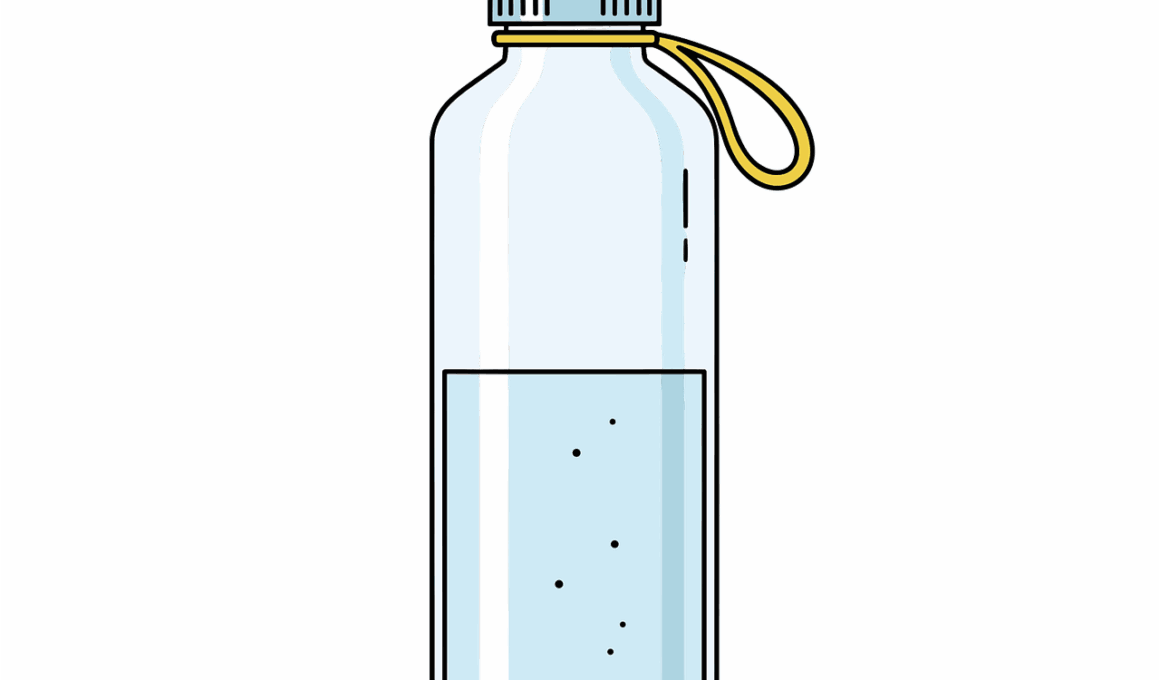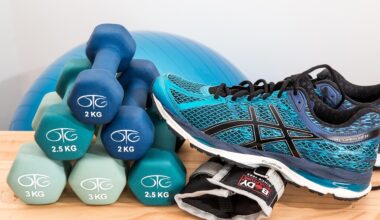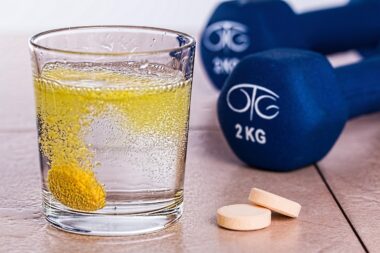Hydration Myths: Separating Fact from Fiction
In the ever-evolving field of sports nutrition, understanding hydration is critical for athletes. Many people hold beliefs about hydration that are based on myth rather than facts. For example, it is often believed that drinking large amounts of water before an event is necessary. In reality, there is a fine balance; excessive water intake can lead to a rare but serious condition called hyponatremia. This occurs when sodium levels in the body become dangerously low. It’s essential to understand individual needs based on activity, climate, and sweat rate. Athletes benefit from hydration strategies tailored to their specific circumstances. Factors like duration and intensity of exercise matter significantly when creating hydration plans. Additionally, electrolyte replenishment is as crucial as water itself for optimal performance and recovery. High-sodium beverages can aid in retaining fluid, which can improve endurance. Thus, athletes must educate themselves on proper hydration practices to enhance their athletic performance. They should consider both the quantity and type of fluids consumed, which vary by sport and individual physiology.
Myth 1: You need to drink eight glasses of water daily
One common hydration myth suggests that everyone needs to drink at least eight glasses of water a day. This guideline is outdated and reflects a one-size-fits-all approach. Hydration needs greatly differ among individuals based on various factors, including body size, age, activity level, and climate. For instance, active individuals or athletes require more fluid, particularly during intense physical activities or in hot conditions. Environmental factors like humidity and altitude further affect hydration needs. The human body has its mechanisms for regulating fluid balance and signals thirst when hydration is needed. Additionally, many foods contain water, contributing to overall fluid intake. Fruits, vegetables, and soups have a significant water content and can aid hydration. Therefore, instead of fixating on a blanket recommendation, individuals should focus on their unique hydration requirements. Listening to one’s body, monitoring hydration status, and staying mindful of fluid intake are crucial strategies for ensuring proper hydration. Relying solely on arbitrary guidelines can lead to suboptimal hydration practices with potential health repercussions.
Myth 2: Thirst is an adequate indicator of hydration
Another prevalent myth is that thirst is a reliable gauge of hydration status. While thirst is an essential indicator, athletes may not always recognize when they are dehydrated. Factors like intense physical activity, extreme heat, or individual variability can dull the thirst response. By the time thirst occurs, an individual might already be experiencing mild dehydration. This state can impair physical performance, cognitive function, and overall well-being. It is especially critical for athletes to proactively manage their fluid intake during prolonged exercise. Relying solely on thirst can lead to inconsistencies in hydration practices. Studies suggest a more systematic approach to hydration, including drink scheduling or monitoring urine color, helps ensure adequate hydration levels. Transparent or pale yellow urine typically indicates proper hydration. Athletes should establish hydration strategies tailored to their training and performance demands, focusing on regular intake rather than waiting for thirst. Often overlooked, the concept of pre-hydration, or consuming fluids before physical activity, proves beneficial. Staying hydrated enhances endurance and helps delay fatigue, allowing for optimal training outcomes.
Myth 3: Sports drinks are only for elite athletes
A common misunderstanding is that sports drinks are only beneficial for elite athletes. This notion undermines the importance of hydration in recreational or novice athletes. While it’s true that professional athletes often use sports drinks during competitions, non-elite athletes also experience significant benefits from such beverages. Sports drinks provide not only hydration but also electrolytes, essential for replacing lost sodium and potassium during prolonged or vigorous exercise. Individuals engaging in physical activities lasting more than an hour can gain from replenishing these electrolytes, significantly enhancing recovery and performance. Additionally, the carbohydrates found in sports drinks serve to provide an energy boost during challenging workouts or competitions. Therefore, recreational athletes, especially in hot weather or high-intensity situations, should not shy away from using sports drinks as part of their hydration strategy. Understanding the context in which to use these beverages is key; they should complement a well-rounded hydration plan that includes water and nutritional foods. Choosing the right beverage based on activity duration and intensity can remarkably influence overall athletic performance.
Myth 4: Water is the best hydration source
While water is essential for hydration, one must recognize that it is not the only effective source. Many believe that only plain water can hydrate the body, overlooking alternatives that can fulfill hydration needs. Sports drinks, coconut water, and fortified beverages offer electrolytes and nutrients beneficial during intense physical activities. Furthermore, certain foods, such as fruits and vegetables, contain high water content and contribute to hydration. For example, watermelon, cucumber, and oranges are excellent options that can enhance hydration. These sources can be particularly useful for individuals who may struggle to consume adequate water throughout the day. However, simply substituting food for drink isn’t ideal during intense workouts where rapid fluid replacement is crucial. Each nutrient-dense option should complement a varied hydration strategy. Balancing water with alternative fluid sources can yield optimal results, especially for athletes and physically active individuals. Ultimately, focusing solely on plain water may not fulfill all hydration needs, and it is critical to explore a combination of beverages and food sources to achieve improved hydration.Adaptation to individual needs is paramount.
Myth 5: All fluids are equally hydrating
A common misconception is that all fluids provide the same level of dehydration. While many beverages, such as coffee and tea, do have diuretic effects, recent research indicates that moderate consumption impacts hydration minimally. These caffeinated beverages still contribute to overall fluid intake. However, excessive levels can lead to dehydration. It’s vital for athletes and active individuals to recognize fluid sources’ varied impact on hydration. Some beverages, like sodas and energy drinks, may contain high sugar levels, potentially leading to dehydration in the long run. Choosing well-balanced beverages lessened sugar content ensures hydration while supporting overall health. Water, low-calorie sports drinks, and natural juices can satisfy hydration needs without significant sugar drawbacks. Personal preference and individual tolerance should also guide beverage choices. Athletes often benefit from customizing their hydration strategies based on personal experiences, preferences, and performance goals. Different sports or training sessions may require varying approaches to hydration. Experimenting with beverage types and timing can yield valuable insights into what promotes optimal hydration for each individual during their exercise routine. Listening to one’s body is critical.
Conclusion: Understanding Hydration Dynamics
In conclusion, navigating hydration myths is fundamental for both athletes and non-athletes alike. By examining common misconceptions, one can begin to make informed choices about hydration practices that suit personal needs. Debunking myths like needing eight glasses of water daily or relying solely on thirst underscores the complexity surrounding hydration. The information presented emphasizes that individualized approaches are imperative for optimal performance and well-being. Strategies that incorporate water, electrolyte-rich drinks, and nutrient-dense foods will greatly enhance athletic performance. Additionally, recognizing the variations in fluid intake based on unique individual factors fosters a more tailored hydration plan. Relying on hydration guidelines and being proactive about fluid consumption ensures that athletes remain in peak condition throughout exercise. Making informed hydration decisions can dramatically impact performance and recovery during and after physical activity. Therefore, education about hydration dynamics should be at the forefront of sports nutrition discussions. A comprehensive understanding of hydration leads to enhanced physical performance and overall health. Athletes who prioritize strategic hydration are likely to see improved outcomes in their training and competition.
Staying hydrated is vital for all, especially athletes. The connection between hydration and optimal performance cannot be emphasized enough. In this light, educating about hydration myths is paramount for athletes and sports enthusiasts. Understanding these nuances leads to improved hydration habits and overall health.





